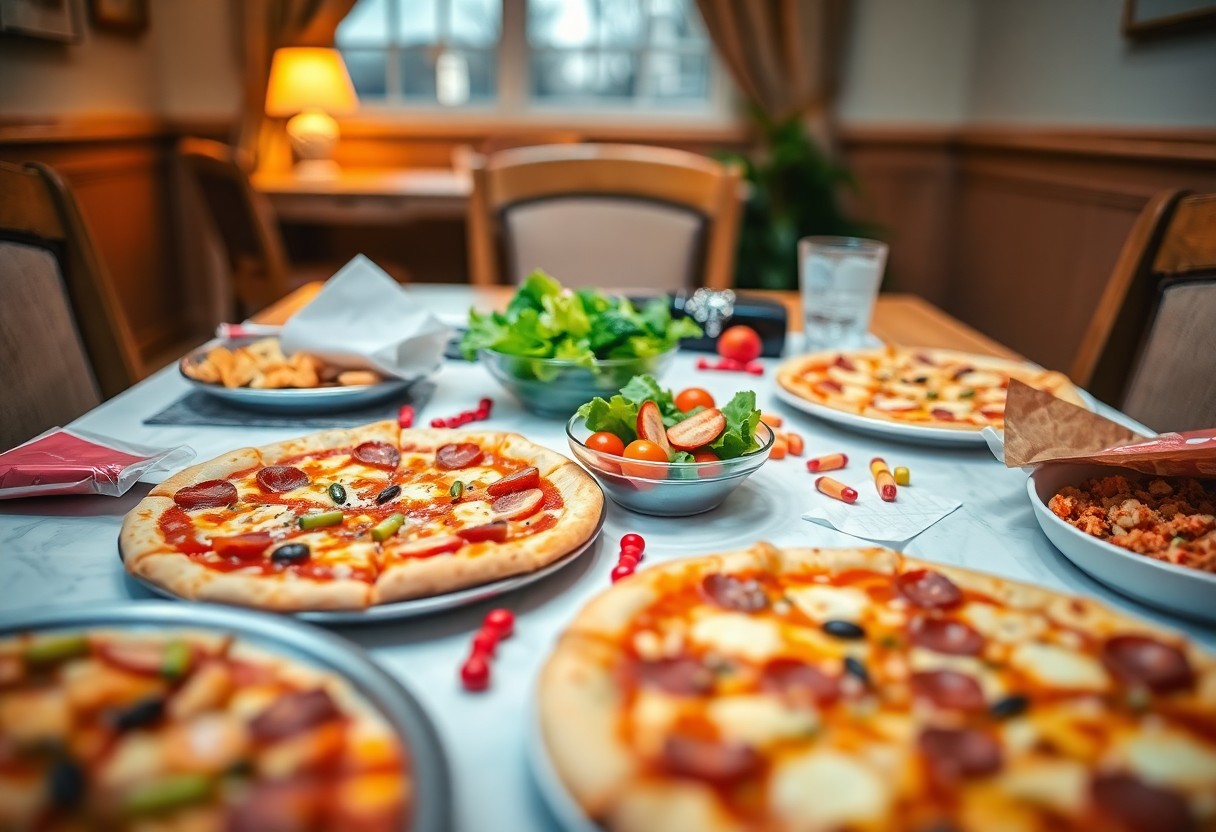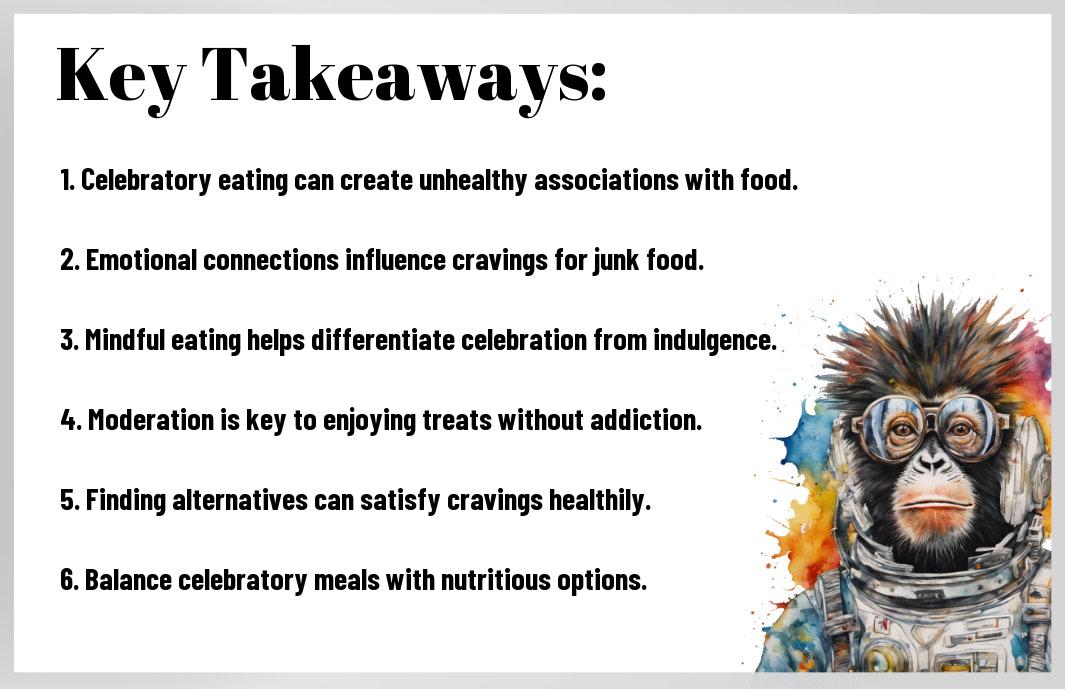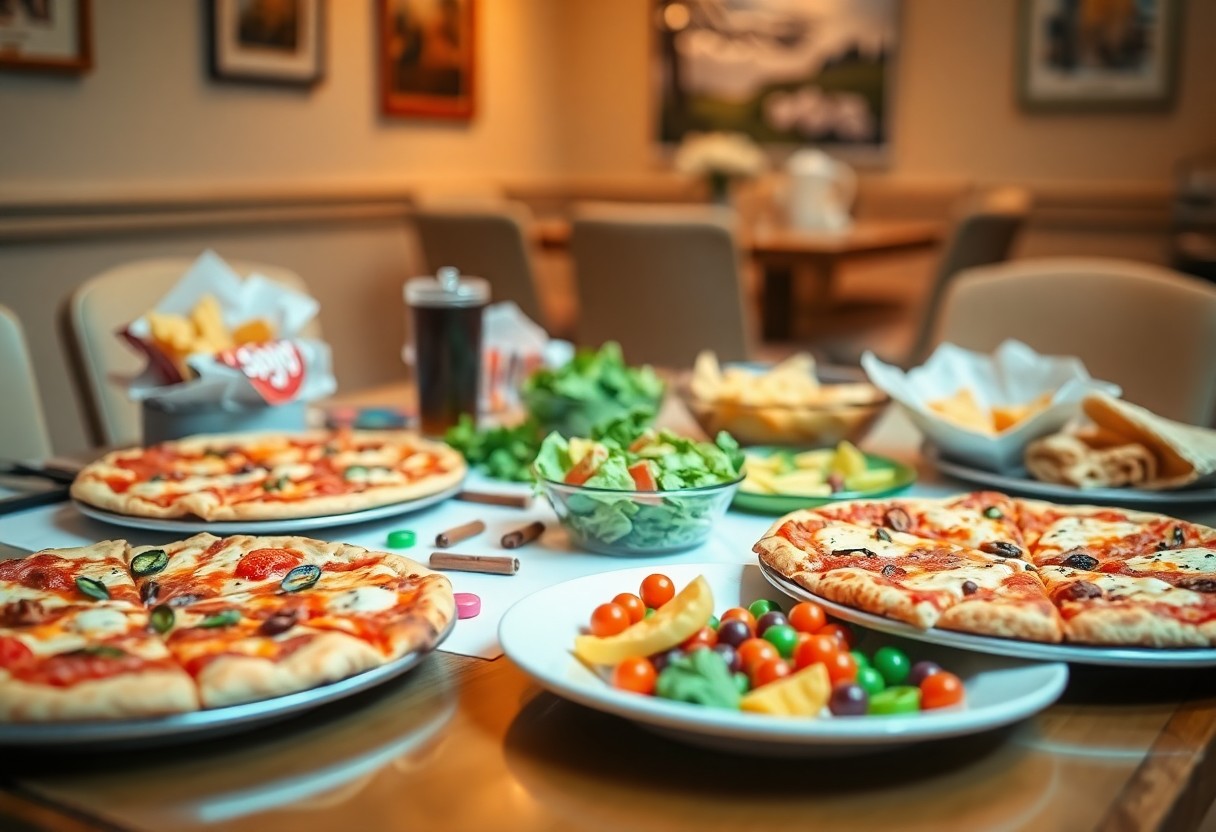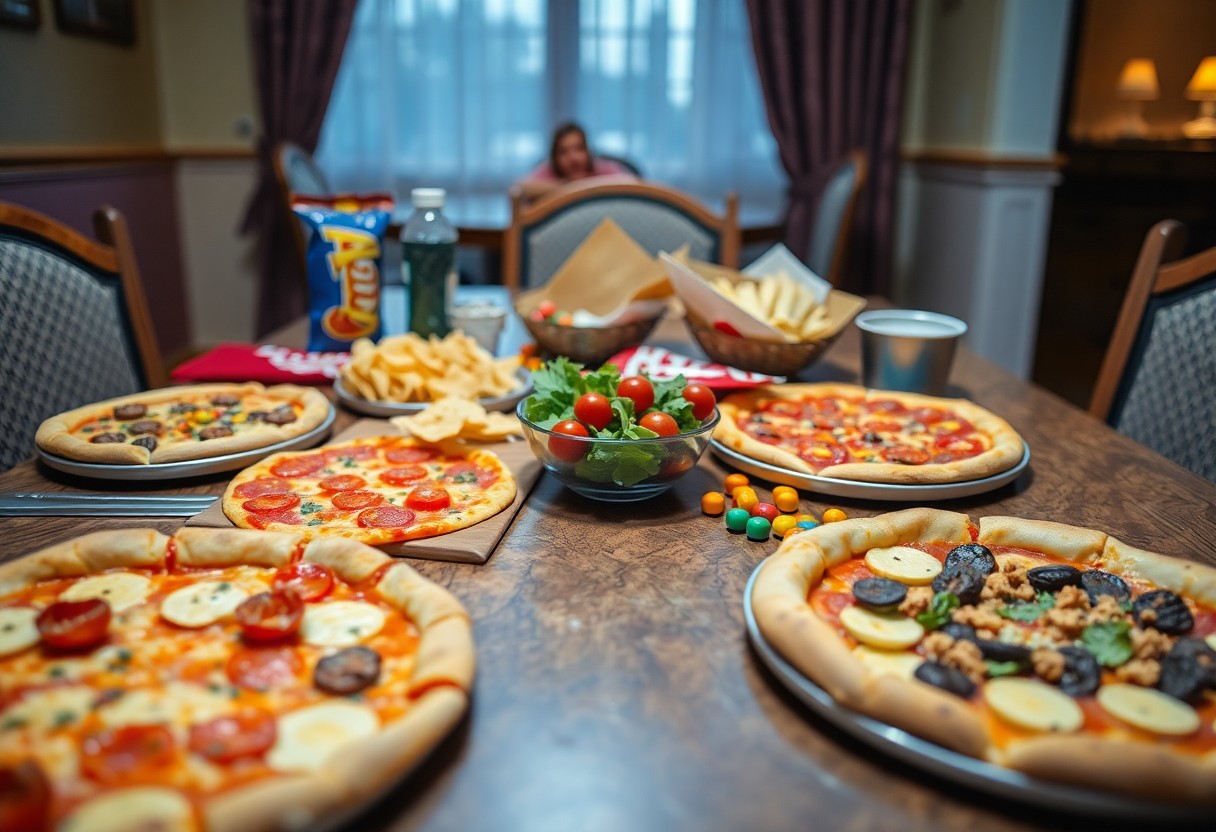Most of us have experienced celebratory eating during holidays and special occasions, often leading to a pattern of relying on junk food for joy. You might be unaware that this habit not only promotes unhealthy eating but also establishes psychological ties to junk food as a source of comfort and reward. I’m here to help you unpack the impact of emotional connections to our meals and how the influence of unhealthy food and beverage marketing exacerbates this issue. Let’s explore how to break this cycle and foster healthier relationships with food.
Key Takeaways:
- Celebratory eating often associates food with positive emotions, reinforcing cravings for unhealthy options during moments of stress or celebration.
- Regular indulgence in junk food during events can lead to a cycle of dependency, where treating oneself becomes a habit rather than an occasional enjoyment.
- To break the cycle, consider creating new traditions around celebrations that focus on activities or mindful eating rather than always resorting to junk food.

The Psychology of Celebratory Eating
As I research into the psychology of celebratory eating, it becomes clear that many of us unwittingly connect joy and happiness with indulgent food choices. This connection often manifests itself as a pattern of emotional eating where food serves not just as sustenance, but as a source of comfort and reward. I find that I can easily fall into this pattern during moments of celebration, whether it’s a birthday, holiday, or even a Friday night. Such occasions frequently lead to consuming food that may not be the healthiest option but is deemed acceptable during ‘special’ times. If you’d like to understand more about this phenomenon, I recommend checking out Emotional Eating and How to Stop It.
Understanding Emotional Cues
Around many celebrating moments, emotional cues can be a powerful driver of my food choices. These cues encompass feelings of happiness, nostalgia, or even stress, paving the way for what I believe to be ‘necessary’ indulgences. Often, I notice that I use these feelings to justify the consumption of food that aligns more with a celebratory gesture rather than my usual eating habits. It’s important to evaluate whether I’m using celebration as an excuse to eat unhealthy foods, which can lead to significant implications for my well-being.
The Role of Social Events
Any social event often acts as a backdrop for celebratory eating, almost making it a communal experience. I personally find that the peer pressure and shared enjoyment of food can amplify my tendencies to overindulge. It’s not just about the food itself, but also the social connections built around it. In these scenarios, the social norms silently endorse the consumption of junk food while celebrating, creating an environment where it feels inadequate not to partake in these lavish food offerings. I’ve recognized that I sometimes use these gatherings as a reason to indulge, reinforcing a cycle of unhealthy eating.
In fact, these social events can create a dangerous alignment between my enjoyment of company and my choices in food. When faced with the temptation to indulge, I often find it easier to surrender to the lavish spread of treats around me. This can lead to a pattern of eating that doesn’t necessarily align with my health goals. It’s vital to understand how the surrounding atmosphere encourages me to prioritize foods that fuel dependency on junk food rather than healthy alternatives. Taking the time to reflect on my relationship with food during these events is vital for breaking the cycle.

The Science Behind Junk Food
Now, understanding the science behind junk food can help shed light on why so many of us find it hard to resist. It’s not just our willpower that comes into play; junk food is meticulously designed to be irresistible. With its carefully balanced combination of sugar, fat, and salt, junk food satisfies cravings in a way that wholesome foods often can’t. This brings about the phenomenon of celebratory eating, where you associate indulgent foods with good times, making it even harder to distinguish between a treat and an unhealthy dependency.
High Sugar and Fat Content
On one hand, the extraordinary high sugar and fat content in junk food activates your taste buds rapidly, creating an immediate sense of pleasure. This is specifically why you’ll find foods that are deep-fried, laden with sugar, or filled with unhealthy fats at parties and celebrations. The higher the amounts of sugar and fat, the more likely you are to crave these foods repeatedly, as their combination provides a quick source of energy and satisfaction, albeit temporarily. This leads to a cycle where you may find yourself reaching for these foods during celebratory occasions, subsequently making it harder to enjoy healthier options.
The Brain’s Reward System
Food plays a significant role in our emotional well-being, particularly when it comes to special occasions or celebratory events. When you consume junk food, it activates the brain’s reward system, releasing chemicals like dopamine that provide feelings of joy and pleasure. This response makes it likely that you will seek out these foods more frequently as your brain begins to associate the consumption of junk food with positive feelings, reinforcing a cycle that can lead to dependency. Over time, this can diminish your appreciation for more nutritious foods, which often take longer to prepare and do not elicit the same immediate gratification.
System signals your brain to crave more of the quick-fix pleasure that junk food provides. This can lead to larger portions and more frequent consumption, creating a loop of dependency that’s hard to break. Over time, this dependency can have negative effects on your physical and emotional health, making it crucial to find a balance between enjoying treats and maintaining a healthy relationship with food. By understanding how your brain rewards you for consuming junk food, I can better navigate my choices during celebrations and understand the underlying reasons behind those cravings. You may want to consider healthier alternatives that can still bring joy without the adverse effects on your health.

Consequences of Celebratory Eating
Despite the joy and excitement that often accompany celebrations, indulging in celebratory eating can lead to a myriad of consequences that affect not only your physical health but also your mental well-being. Each occasion of feasting on junk food may seem harmless at the moment, yet the cumulative effects can be quite significant over time. When I take part in these celebrations, I often find myself consuming high amounts of sugar, unhealthy fats, and excessive calories, which can contribute to weight gain, energy crashes, and even long-term health issues such as heart disease and diabetes. It’s imperative to recognize how these festive moments can transform into unhealthy eating patterns that linger long after the party has ended.
Health Implications
Consequences of celebratory eating extend beyond just a temporary indulgence. Research indicates that frequent consumption of junk food can lead to numerous health risks, including obesity, high cholesterol, and hypertension. In my experience, I’ve noticed that these unhealthy food choices can also lead to mental health struggles such as anxiety and depression, which are often exacerbated by fluctuations in blood sugar levels caused by excessive junk food intake. Additionally, I find that certain celebrations cause me to develop a preference for sugary and salty snacks, making it harder to enjoy healthier options in mundane situations.
Long-term Eating Habits
For many individuals, including myself, celebratory eating can easily morph into long-term unhealthy eating habits. It’s effortless to fall into a rhythm where the thrill of a celebration signals a time to indulge, creating a pattern that extends beyond these special occasions. I have witnessed friends who, after many events centered around food, gradually shift their everyday eating towards more convenience-based and less nutritionally-dense options. The real danger lies in the normalization of junk food as a reward mechanism, which can lead to a reliance on unhealthy eating as a coping strategy for stress or boredom.
This reliance on junk food can significantly alter your relationship with food over time, making it increasingly difficult to choose healthier options during regular meals or snack times. The repeated engagement in celebratory eating can develop a psychological association between events and treats, leading to feelings of guilt or shame whenever you attempt to break the cycle. It’s important to reflect on your own habits and seek healthier alternatives that provide fulfillment without the adverse effects, ensuring that celebrations can be enjoyed without compromising your long-term health goals.
Breaking the Cycle
After years of indulging in celebratory eating, I found myself trapped in a cycle that fed my dependency on junk food. Each birthday, holiday, or even casual get-together was an opportunity to indulge in unhealthy treats, leading to guilt and regret afterward. To break this cycle, I realized I needed to make conscious choices about how I celebrated and what I consumed, focusing on healthier alternatives that wouldn’t fuel my cravings for junk food.
Mindful Eating Practices
Between the rush of celebrations and the excitement of indulgence, I discovered the importance of mindful eating practices. I started paying attention to my body’s hunger cues and making a concerted effort to savor each bite rather than mindlessly devouring the food available at gatherings. By focusing on the flavors and textures of healthier options, I began to foster a deeper appreciation for food and its role in my life, which lessened my dependency on unhealthy snacks.
Alternative Celebration Strategies
Against the backdrop of traditional food-centric celebrations, I explored alternative celebration strategies that prioritized my well-being over junk food. Activities such as hosting a game night, planning a healthy potluck, or even enjoying an outdoor picnic shifted the focus from what I was eating to the experiences I was sharing with others. This change in strategy not only reduced my consumption of junk food but also enhanced my social interactions, making them more fulfilling and meaningful.
Hence, I found immense value in creating celebrations that do not revolve around food. By consciously choosing alternative activities, I opened up the opportunity to engage in creative and enjoyable experiences, such as cooking together, participating in community events, or even exploring new hobbies with friends. Shifting my perspective from food as the centerpiece of celebration to shared moments and joyous activities allows me to enjoy life without falling back into the trap of junk food dependency.
Real-Life Case Studies
Not surprisingly, I found several compelling real-life case studies that illustrate how celebratory eating correlates with an increased dependency on junk food. Understanding these examples can help you evaluate your own behaviors and food relationships. Here are a few significant instances backed by data:
- A study from the *Journal of Health Psychology* revealed that 78% of respondents reported indulging in *celebratory eating* during events but struggled with *cravings for junk food* afterward.
- Research conducted by the *American Journal of Clinical Nutrition* indicated that among participants who celebrated with food, 65% noticed an increase in their consumption of *processed snacks* in the following week.
- In a survey of 1,000 individuals, 54% shared that *emotional connections* to food celebrations led to a decline in their overall *nutritional choices*, pointing towards a stronger dependency on *unhealthy food options*.
- A longitudinal study found that participants who often used food for celebration reported consuming 30% more calories from *junk food* compared to the control group.
Personal Experiences
Experiences vary when it comes to celebratory eating, and I have seen firsthand how these can lead to a higher dependency on junk food. Anecdotal stories reveal a pattern: after attending special occasions like birthdays or weddings, many people find themselves unconsciously reaching for *chips*, *sodas*, and other snack foods long after the event has ended. This behavior not only affects their immediate well-being but also creates a lingering reliance on these unhealthy choices.
Many individuals, including myself, have felt a sense of guilt when returning to junk food post-celebration. I’ve had personal conversations with friends who shared how they would indulge in their favorite treats during a holiday feast, only to find those cravings creeping back into their lives, often leading to a cycle of *mindless eating*. This experience reflects the mental trap that celebratory eating can create.
Expert Opinions
About the topic of celebratory eating, experts often highlight the psychological impact it can have on our food choices. Nutritionists and psychologists alike suggest that using food as a reward or a way to celebrate can often backfire, leading to increased cravings for *junk food*. They argue that celebratory eating should be approached with caution, as it can set a precedent for unhealthy eating patterns.
At their core, these expert opinions revolve around the understanding that food is not merely sustenance but is wrapped in a host of emotional ties and social norms. I have come across professionals who emphasize the pattern of *hedonic eating*, where the pleasure derived from indulgence can lead to detrimental effects on your overall health. While celebrating personal milestones and achievements is important, it is imperative to acknowledge how often these moments can send us spiraling towards a cycle of unhealthy habits. Recognizing these patterns can empower you to make informed choices that align more closely with your health goals.
Strategies for Balanced Celebrations
Once again, as I emphasize the importance of finding equilibrium in our celebrations, it’s crucial to develop strategies that keep our indulgences in check while still allowing us to enjoy special moments. A significant part of this process is becoming mindful of the food choices we make during these events. Opting for healthier alternatives not only satisfies festive cravings but also helps reduce our reliance on processed junk food that often dominates celebration spreads.
Healthier Eating Options
Strategies for healthier eating options can include preparing dishes that are both delicious and nutritious. When you plan your celebrations, consider incorporating fresh fruits and vegetables into your menu. Rather than a traditional cheese platter filled with high-calorie options, you might opt for a vibrant antipasto array with olives, roasted peppers, and assorted dips made from legumes. These choices not only elevate the meal but help you maintain your energy levels and wellness without sacrificing flavor.
Incorporating Movement
At celebrations, it’s easy to find ourselves sitting for long periods, tending to snacks and beverages. I advocate for integrating movement into your festivities as a fun way to enhance both the atmosphere and your well-being. Organizing interactive games or even casual walks after indulging can offer great benefits. Not only does this encourage a degree of physical activity, but it also allows you and your guests to digest properly and elevate your overall mood.
With movement incorporated into your celebrations, you’re not just promoting a healthier lifestyle, but also fostering a positive social environment. Engaging in activities like dancing, lawn games, or a simple group walk can be just as enjoyable as indulging in food. These actions serve to create lasting memories while helping to keep our bodies active, reducing the focus solely on the junk food surrounding us. I believe that blending celebration with movement is a fantastic way to cherish special moments while maintaining balance in our eating habits.
Summing up
To wrap up, I believe it’s important to reflect on how celebratory eating may be influencing your relationship with junk food. While indulging during special occasions can seem harmless, I have seen how frequent associations between celebrations and unhealthy food choices can lead to a dependency on junk food. You may find that every birthday, holiday, or social gathering becomes an opportunity to indulge, which can create an unhealthy cycle of emotional eating that is hard to break. Recognizing these patterns in your own life is the first step toward establishing a healthier relationship with food.
As I navigate this topic, I encourage you to evaluate your motivations behind celebratory eating. Are you nourishing your body, or are you using those moments as an excuse to indulge in foods that may not serve your well-being? By becoming more mindful of your eating habits during celebrations, you can begin to enjoy food without letting it control your choices. Shifting your perspective on food and truly embracing the joy of gatherings can lead to a more balanced and fulfilling approach to eating.
FAQ
Q: What is celebratory eating and how does it relate to junk food?
A: Celebratory eating refers to the practice of consuming certain foods during special occasions or events to mark a celebration, such as birthdays, holidays, or achievements. This often includes indulgent treats and junk food. While it’s natural to enjoy these foods during celebrations, doing so frequently can lead to a habit of reaching for junk food in non-celebratory contexts, potentially increasing dependency on unhealthy eating patterns.
Q: Can celebratory eating create emotional associations with junk food?
A: Yes, celebratory eating can create strong emotional connections with junk food. Many people associate specific treats with joy or happiness from celebrations, which can lead to a pattern where individuals turn to these comfort foods in times of stress or sadness. Over time, these associations may contribute to cravings for junk food outside of celebratory events, reinforcing a preference for unhealthy options.
Q: How can I distinguish between celebratory eating and excessive junk food consumption?
A: To differentiate between celebratory eating and excessive consumption of junk food, consider your intentions and the context of your eating. Celebratory eating occurs for special events and typically involves moderation, while excessive consumption might involve frequent indulging without a special occasion, often driven by emotions or habits. Keeping a food diary can help identify patterns and trigger points related to junk food consumption.
Q: What strategies can I use to enjoy celebratory eating without relying on junk food?
A: One approach is to plan healthier options for celebrations, such as incorporating fruits, whole grains, or healthier homemade dishes alongside traditional treats. Setting limits on portions of junk food and incorporating mindful eating practices can also help. Focus on the social aspects of the celebration rather than solely on the food, which can shift the emphasis away from unhealthy choices.
Q: How can breaking the dependency on junk food enhance my overall health?
A: Breaking the dependency on junk food can lead to numerous health benefits, including improved energy levels, better digestion, weight management, and enhanced mood stability. Ultimately, adopting a balanced diet filled with whole, nutritious foods may reduce cravings for junk food and allow for a more consistent intake of beneficial nutrients, contributing to overall well-being.



0 Comments